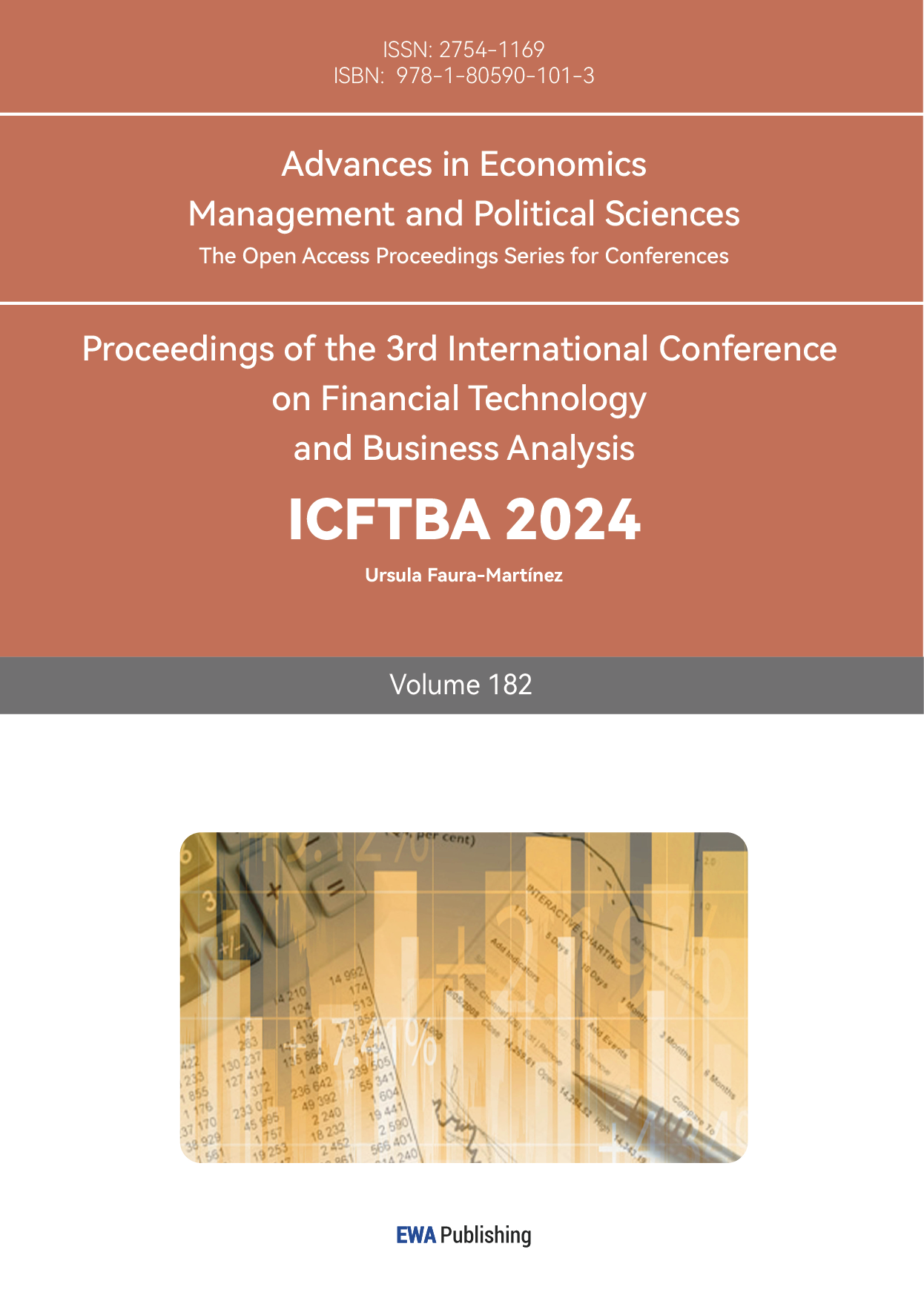References
[1]. Nazir, S., Khadim, S., Ali Asadullah, M., Syed, N. (2023) Exploring the influence of artificial intelligence technology on consumer repurchase intention: The mediation and moderation approach. Technology in Society,72.
[2]. Nazir, S., Khadim, S., Ali Asadullah, M., Syed, N. (2023) Exploring the influence of artificial intelligence technology on consumer repurchase intention: The mediation and moderation approach. Technology in Society,72.
[3]. Gang Cai, Chunmei Ni(Computational Intelligence and Neuroscience. ), 2022. The Analysis of Sharing Economy on New Business Model Based on BP Neural Network | Computational Intelligence and Neuroscience. https://dl.acm.org/doi/10.1155/2022/4974564.
[4]. Xu, X. (2020) How do consumers in the sharing economy value sharing? Evidence from online reviews. Decision Support Systems, 128.
[5]. Pappas, N. (2019) The complexity of consumer experience formulation in the sharing economy. International Journal of Hospitality Management, 77: 415–424.
[6]. Li, Y., Li, B., Wang, G. & Yang, S. (2021) The effects of consumer animosity on demand for sharing-based accommodations: Evidence from Airbnb. Decis. Support Syst. 140.
[7]. Su-Jung Nam, Hyesun Hwang(Corporate Social Responsibility and Environmental Management-Wiley Online Library), 2018. What makes consumers respond to creating shared value strategy? Considering consumers as stakeholders in sustainable development, https://onlinelibrary.wiley.com/doi/10.1002/csr.1690.
[8]. Naeun Lauren Kim, Byoungho Ellie Jin(International Journal of Consumer Studies-Wiley Online Library), 2020. Why buy new when one can share? Exploring collaborative consumption motivations for consumer goods. https://onlinelibrary.wiley.com/doi/10.1111/ijcs.12551.
[9]. João Felix, Michel Alexandre , Gilberto Tadeu Lima (Computational Economics.-SPRINGER LINK), 2024. Applying Machine Learning Algorithms to Predict the Size of the Informal Economy. https://link.springer.com/article/10.1007/s10614-024-10593-6.
[10]. Tussyadiah, I. P. , Pesonen, J. (2018) Drivers and barriers of peer-to-peer accommodation stay – an exploratory study with American and Finnish travellers. Curr. Issues Tour, 21:703–720.
Cite this article
Wang,J.;Yang,Y.;Wu,T. (2025). How Al Enhancements to SE Platforms Affecting User Experience to Benefit Conversion. Advances in Economics, Management and Political Sciences,182,59-65.
Data availability
The datasets used and/or analyzed during the current study will be available from the authors upon reasonable request.
Disclaimer/Publisher's Note
The statements, opinions and data contained in all publications are solely those of the individual author(s) and contributor(s) and not of EWA Publishing and/or the editor(s). EWA Publishing and/or the editor(s) disclaim responsibility for any injury to people or property resulting from any ideas, methods, instructions or products referred to in the content.
About volume
Volume title: Proceedings of the 3rd International Conference on Financial Technology and Business Analysis
© 2024 by the author(s). Licensee EWA Publishing, Oxford, UK. This article is an open access article distributed under the terms and
conditions of the Creative Commons Attribution (CC BY) license. Authors who
publish this series agree to the following terms:
1. Authors retain copyright and grant the series right of first publication with the work simultaneously licensed under a Creative Commons
Attribution License that allows others to share the work with an acknowledgment of the work's authorship and initial publication in this
series.
2. Authors are able to enter into separate, additional contractual arrangements for the non-exclusive distribution of the series's published
version of the work (e.g., post it to an institutional repository or publish it in a book), with an acknowledgment of its initial
publication in this series.
3. Authors are permitted and encouraged to post their work online (e.g., in institutional repositories or on their website) prior to and
during the submission process, as it can lead to productive exchanges, as well as earlier and greater citation of published work (See
Open access policy for details).
References
[1]. Nazir, S., Khadim, S., Ali Asadullah, M., Syed, N. (2023) Exploring the influence of artificial intelligence technology on consumer repurchase intention: The mediation and moderation approach. Technology in Society,72.
[2]. Nazir, S., Khadim, S., Ali Asadullah, M., Syed, N. (2023) Exploring the influence of artificial intelligence technology on consumer repurchase intention: The mediation and moderation approach. Technology in Society,72.
[3]. Gang Cai, Chunmei Ni(Computational Intelligence and Neuroscience. ), 2022. The Analysis of Sharing Economy on New Business Model Based on BP Neural Network | Computational Intelligence and Neuroscience. https://dl.acm.org/doi/10.1155/2022/4974564.
[4]. Xu, X. (2020) How do consumers in the sharing economy value sharing? Evidence from online reviews. Decision Support Systems, 128.
[5]. Pappas, N. (2019) The complexity of consumer experience formulation in the sharing economy. International Journal of Hospitality Management, 77: 415–424.
[6]. Li, Y., Li, B., Wang, G. & Yang, S. (2021) The effects of consumer animosity on demand for sharing-based accommodations: Evidence from Airbnb. Decis. Support Syst. 140.
[7]. Su-Jung Nam, Hyesun Hwang(Corporate Social Responsibility and Environmental Management-Wiley Online Library), 2018. What makes consumers respond to creating shared value strategy? Considering consumers as stakeholders in sustainable development, https://onlinelibrary.wiley.com/doi/10.1002/csr.1690.
[8]. Naeun Lauren Kim, Byoungho Ellie Jin(International Journal of Consumer Studies-Wiley Online Library), 2020. Why buy new when one can share? Exploring collaborative consumption motivations for consumer goods. https://onlinelibrary.wiley.com/doi/10.1111/ijcs.12551.
[9]. João Felix, Michel Alexandre , Gilberto Tadeu Lima (Computational Economics.-SPRINGER LINK), 2024. Applying Machine Learning Algorithms to Predict the Size of the Informal Economy. https://link.springer.com/article/10.1007/s10614-024-10593-6.
[10]. Tussyadiah, I. P. , Pesonen, J. (2018) Drivers and barriers of peer-to-peer accommodation stay – an exploratory study with American and Finnish travellers. Curr. Issues Tour, 21:703–720.









